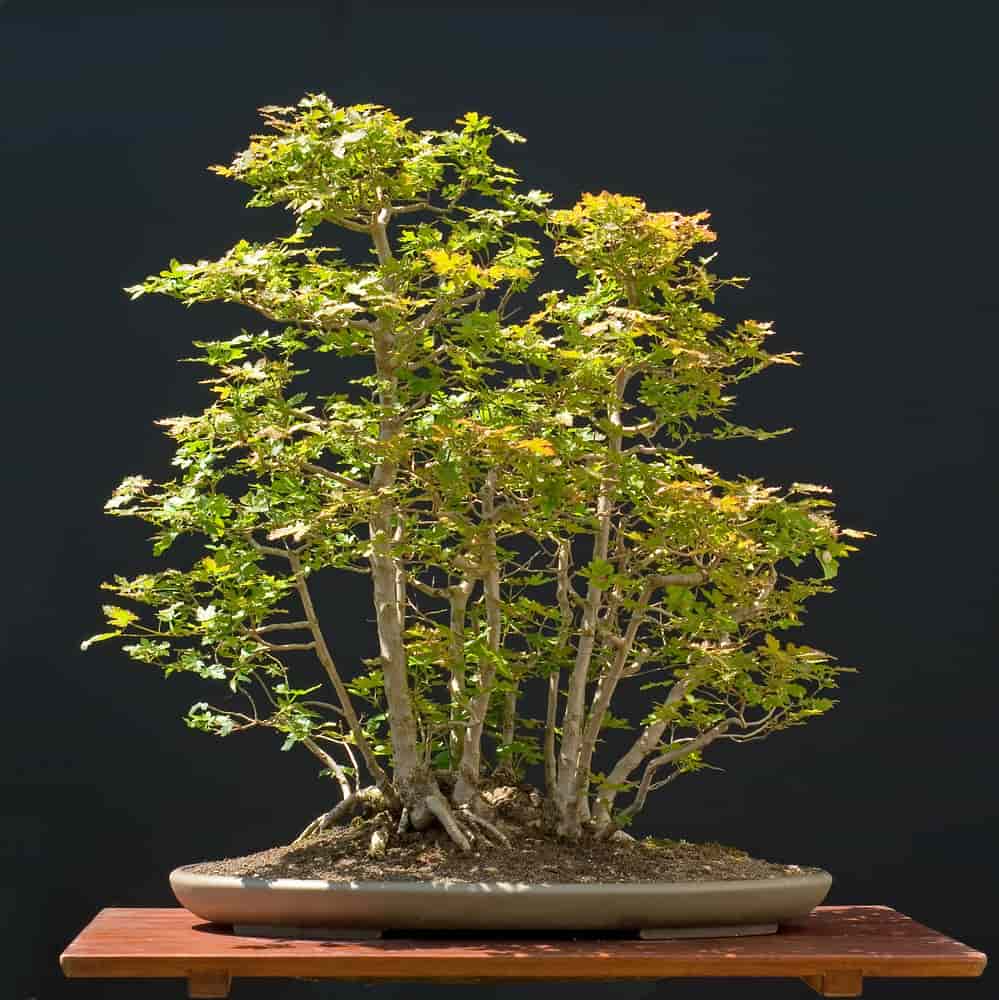**Hedge Maple Bonsai Tree Care**Water the Hedge Maple bonsai regularly but avoid waterlogging. Prune it to maintain shape and encourage dense foliage.
Hedge Maple bonsai trees, known for their vibrant green leaves and attractive bark, make excellent additions to any bonsai collection. Originating from Europe and Western Asia, these trees adapt well to various climates. They thrive in well-draining soil and require regular watering, especially during the growing season.
Pruning is essential to maintain their compact form and promote healthy growth. Regular fertilization ensures they receive necessary nutrients. Place them in a location with ample sunlight, but protect them from intense midday sun. With proper care, a Hedge Maple bonsai will flourish, providing beauty and tranquility to your space.

Credit: www.bonsaiable.com
Introduction To Hedge Maple Bonsai
Caring for a Hedge Maple Bonsai involves proper watering, pruning, and sunlight. Ensure the tree receives adequate moisture and regular trimming to maintain its shape. This resilient bonsai thrives with moderate sunlight and a well-draining soil mix.
History And Origin
The Hedge Maple Bonsai has a rich history. It originated in Europe and Western Asia. People have cultivated it for centuries. This tree is well-known for its beauty and durability. Gardeners love its easy care. Its leaves change colors with seasons. This makes it a popular choice among bonsai enthusiasts.
Unique Characteristics
The Hedge Maple Bonsai has small, lobed leaves. These leaves are bright green in spring. They turn yellow and orange in fall. The tree has a sturdy trunk. It can be shaped easily. Its roots spread wide, providing stability. This bonsai is resistant to many pests and diseases. It is also tolerant of urban conditions.
Choosing The Right Hedge Maple Bonsai
Pick a tree with bright green leaves. Avoid trees with spots or brown edges. Check the trunk for any signs of damage or disease. A strong, straight trunk is ideal. Look for a tree with a few well-spaced branches. Healthy roots are also important. Gently pull the tree from its pot to inspect the roots. White or light-colored roots indicate a healthy tree.
The best size for beginners is a small to medium tree. A tree between 6 and 12 inches is easy to manage. Look for a tree with a natural shape. Avoid trees that look too tall or too wide. A well-balanced tree is easier to care for. A compact shape with even growth is best.
Optimal Soil And Potting Conditions
The best soil for a Hedge Maple Bonsai is well-draining. Akadama, pumice, and lava rock are excellent choices. These soils help prevent root rot. Organic soil can also be mixed in. This adds nutrients. Avoid heavy clay soils. They retain too much water.
A shallow pot is ideal for a Hedge Maple Bonsai. It helps control root growth. Ensure the pot has drainage holes. This prevents waterlogging. The material of the pot can be ceramic or plastic. Ceramic pots look more traditional. Plastic pots are more durable. Choose a pot that is proportional to the tree’s size. This ensures balanced growth and stability.
Watering Techniques
Proper watering ensures the health of Hedge Maple Bonsai trees. Maintain moist soil, avoiding waterlogged conditions. Regularly check moisture levels to prevent dehydration.
Frequency And Amount
Water your Hedge Maple Bonsai regularly. The soil should stay moist but not soggy. Watering once a day is often enough. Check the soil before watering again. If the top inch is dry, it’s time to water. Use a watering can with a fine nozzle. This helps distribute water evenly.
Signs Of Overwatering
Yellow leaves are a sign of overwatering. Check for mold or fungus on the soil. This also means too much water. The roots can rot if overwatered. Watch for a musty smell. This is another sign of too much water. Let the soil dry out a bit if you see these signs.
Pruning And Shaping
Pruning and shaping are crucial for maintaining a healthy Hedge Maple Bonsai Tree. Regular trimming encourages dense foliage and enhances the tree’s aesthetic appeal.
Pruning Basics
Pruning helps keep your bonsai small and healthy. Cut branches that grow too long. Use sharp scissors for clean cuts. Remove dead or damaged branches. This allows new growth to thrive. Trim leaves to shape the tree. Make sure sunlight reaches all parts of the tree.
Advanced Shaping Methods
Wiring helps shape the bonsai tree. Wrap wire around branches gently. Bend branches to the desired shape. Remove the wire after a few months. Clip and grow method also helps. Cut back long branches. New shoots will grow, adding to the shape.
Fertilization And Nutrients
Organic fertilizers work well with Hedge Maple Bonsai. They provide natural nutrients. Slow-release fertilizers are also a good choice. They feed the tree over time. Liquid fertilizers offer quick results. Use them for a fast nutrient boost.
Fertilize your bonsai every two weeks during spring. Continue this until late summer. Reduce fertilization in fall and winter. Use half the recommended dose in these seasons. Always water the tree before applying fertilizer.
Pest And Disease Management
Aphids and spider mites are common pests. Aphids suck sap from the leaves. Spider mites spin webs on the tree. Both pests can weaken the bonsai. Use insecticidal soap to treat them. Regular inspection helps in early detection.
Fungal infections are a common problem. Avoid overwatering the tree. Ensure good air circulation around the bonsai. Remove any fallen leaves from the soil. Use a fungicide if you see any signs of disease. Keep the bonsai in a clean environment.
Seasonal Care Tips
Caring for a Hedge Maple Bonsai Tree requires seasonal adjustments. Ensure proper watering and sunlight exposure during each season. Prune regularly to maintain shape and health.
Winter Protection
Bonsai trees need special care in winter. Protect them from freezing temperatures. Place the tree in a cool, frost-free area. Use mulch to insulate the roots. Check for signs of frost damage regularly. Water the tree sparingly. Excess water can freeze and harm the roots.
Summer Maintenance
In summer, bonsai trees need more water. Check the soil daily. Water the tree when the top layer feels dry. Place the tree in a spot with morning sun and afternoon shade. Use a balanced fertilizer monthly. Trim the leaves to maintain shape and health. Watch out for pests and treat them promptly.
Common Mistakes To Avoid
Neglecting proper watering and pruning can lead to unhealthy Hedge Maple Bonsai trees. Ensure adequate sunlight and avoid over-fertilizing to maintain optimal growth.
Over Pruning
Over pruning can harm your bonsai tree. Always prune with care. Cut only dead or weak branches. Too much pruning can stress the tree. It can slow down growth. Give the tree time to heal between prunings.
Improper Watering
Improper watering can damage your bonsai. Water it deeply and less often. Make sure the soil drains well. Too much water can cause root rot. Too little water can dry the roots. Check the soil before watering again. Keep the soil moist, not wet.

Credit: www.reddit.com

Credit: stonelantern.com
Conclusion
Caring for a Hedge Maple Bonsai Tree can be rewarding. Follow these tips for a thriving bonsai. Regular pruning, proper watering, and suitable soil mix are essential. With patience and dedication, your bonsai will flourish beautifully. Enjoy the journey of nurturing your Hedge Maple Bonsai Tree!

